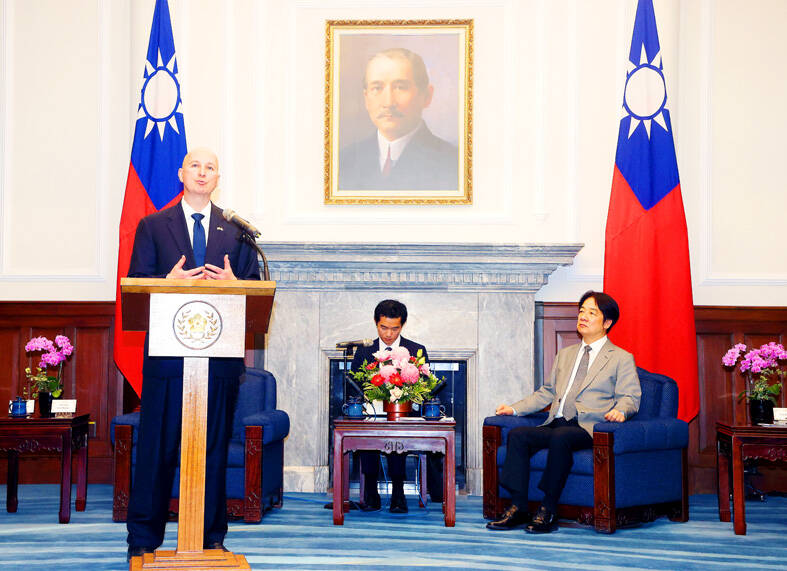The US would continue to assist Taiwan with its self-defense and wants to see peace across the Taiwan Strait without coercion or the threat of force, a visiting US senator told President William Lai (賴清德) yesterday.
Republican Senator Pete Ricketts in a meeting with Lai at the Presidential Office in Taipei said that although administrations change, bipartisan support for Taiwan in the US Congress has continued.
“The United States is committed to peace and stability in the Indo-Pacific. We want to see peace across the Taiwan Strait. We oppose any unilateral change in the status of Taiwan,” Ricketts said.

Photo: CNA
“We expect any differences between Taiwan and the mainland to be resolved peacefully without coercion or the threat of force,” he said. “To that end, the United States will continue to assist Taiwan in its self-defense. There is broad consensus in the US Congress to support Taiwan’s self-defense.”
Lai said that he looked forward to Taiwan and the US continuing to work together to maintain peace and stability in the region, and that Taiwan was committed to spending more on its defense.
A bipartisan group of US lawmakers are on their first trip to Taiwan under the new administration, aiming to show Taipei and Beijing that Washington’s support for Taiwan’s defense remains broad, despite the harsh words and tariffs from US President Donald Trump.
Ricketts is being accompanied by Republican Senator Ted Budd and Democratic Senator Chris Coons.
Many Asia-Pacific nations are eschewing the retaliatory criticism and tariffs of some of the US’ European allies after Trump earlier this month slapped broad tariffs on many countries around the world, including 32 percent for Taiwan.
Despite that hit, conversations in Taiwan this week were “optimistic and forward-looking,” Coons said, adding that he was “optimistic that we’re going to see a strong next chapter in US-Taiwan relations.”
That includes assurances from Taiwanese that they are working fast to strike new trade and investment deals that suit the Trump administration.
Learning from Ukraine’s defense against Russia and criticism from Trump, Taiwan also said it is investing fast to make the military stronger, nimbler and less dependent on the US, as the nation’s strongest deterrent against China, the US lawmakers said.
That includes seeking investment with the US on drone warfare, learning from Ukraine using fleet fighting forces with portable Stingers, the lawmakers said.
The senators made the remarks ahead of talks yesterday with Lai, Minister of National Defense Wellington Koo (顧立雄) and National Security Council Secretary-General Joseph Wu (吳釗燮).
Ricketts said Taiwanese leaders had already reached out to US Secretary of Commerce Howard Lutnick for negotiations, moving quickly in the 90-day pause that Trump announced before the US starts enforcing the new tariffs.
Regarding China, Coons said: “Of course, there is the possibility that [Chinese President] Xi Jinping [習近平] would decide that this is the right time for the Chinese Communist Party to take aggressive action.”
“I think it’s exactly the wrong thing for them to do,” Coons said. “I think they would find a forceful and united response.”

INVESTIGATION: The case is the latest instance of a DPP figure being implicated in an espionage network accused of allegedly leaking information to Chinese intelligence Democratic Progressive Party (DPP) member Ho Jen-chieh (何仁傑) was detained and held incommunicado yesterday on suspicion of spying for China during his tenure as assistant to then-minister of foreign affairs Joseph Wu (吳釗燮). The Taipei District Prosecutors’ Office said Ho was implicated during its investigation into alleged spying activities by former Presidential Office consultant Wu Shang-yu (吳尚雨). Prosecutors said there is reason to believe Ho breached the National Security Act (國家安全法) by leaking classified Ministry of Foreign Affairs information to Chinese intelligence. Following interrogation, prosecutors petitioned the Taipei District Court to detain Ho, citing concerns over potential collusion or tampering of evidence. The

‘FORM OF PROTEST’: The German Institute Taipei said it was ‘shocked’ to see Nazi symbolism used in connection with political aims as it condemned the incident Sung Chien-liang (宋建樑), who led efforts to recall Democratic Progressive Party (DPP) Legislator Lee Kun-cheng (李坤城), was released on bail of NT$80,000 yesterday amid an outcry over a Nazi armband he wore to questioning the night before. Sung arrived at the New Taipei City District Prosecutors’ Office for questioning in a recall petition forgery case on Tuesday night wearing a red armband bearing a swastika, carrying a copy of Adolf Hitler’s Mein Kampf and giving a Nazi salute. Sung left the building at 1:15am without the armband and apparently covering the book with a coat. This is a serious international scandal and Chinese

Seventy percent of middle and elementary schools now conduct English classes entirely in English, the Ministry of Education said, as it encourages schools nationwide to adopt this practice Minister of Education (MOE) Cheng Ying-yao (鄭英耀) is scheduled to present a report on the government’s bilingual education policy to the Legislative Yuan’s Education and Culture Committee today. The report would outline strategies aimed at expanding access to education, reducing regional disparities and improving talent cultivation. Implementation of bilingual education policies has varied across local governments, occasionally drawing public criticism. For example, some schools have required teachers of non-English subjects to pass English proficiency

TRADE: The premier pledged safeguards on ‘Made in Taiwan’ labeling, anti-dumping measures and stricter export controls to strengthen its position in trade talks Products labeled “made in Taiwan” must be genuinely made in Taiwan, Premier Cho Jung-tai (卓榮泰) said yesterday, vowing to enforce strict safeguards against “origin laundering” and initiate anti-dumping investigations to prevent China dumping its products in Taiwan. Cho made the remarks in a discussion session with representatives from industries in Kaohsiung. In response to the US government’s recent announcement of “reciprocal” tariffs on its trading partners, President William Lai (賴清德) and Cho last week began a series of consultations with industry leaders nationwide to gather feedback and address concerns. Taiwanese and US officials held a videoconference on Friday evening to discuss the